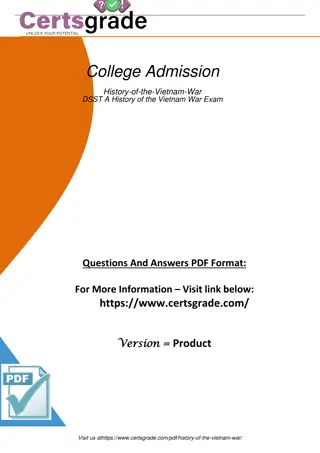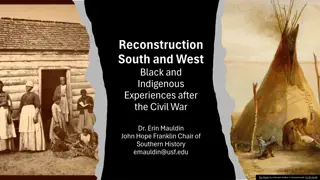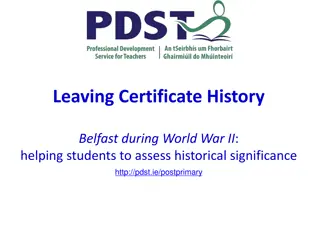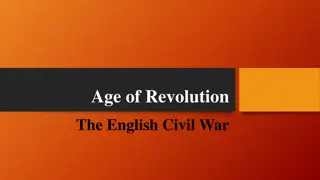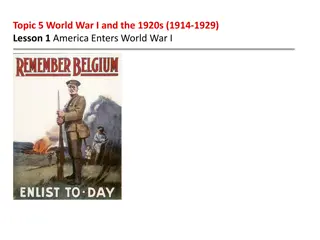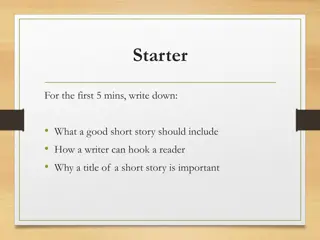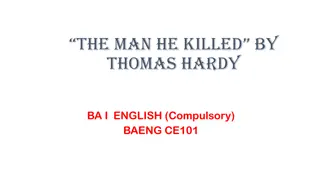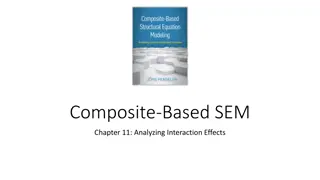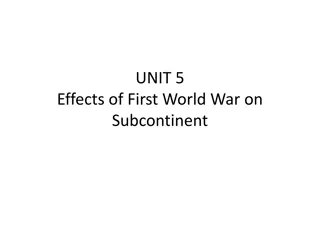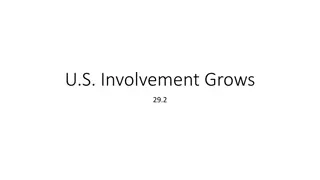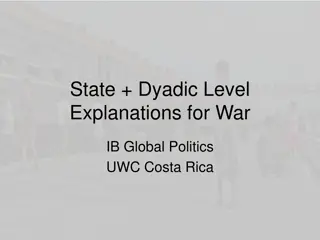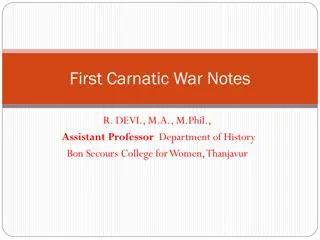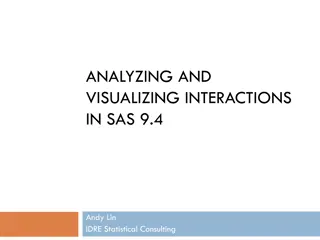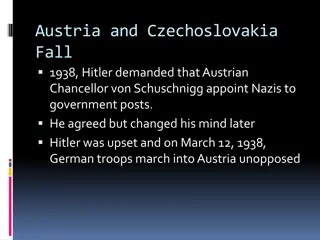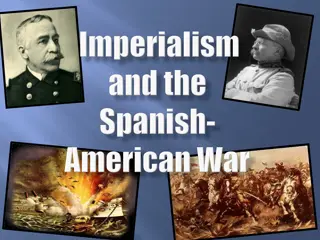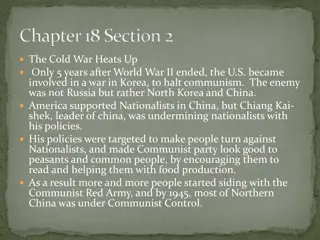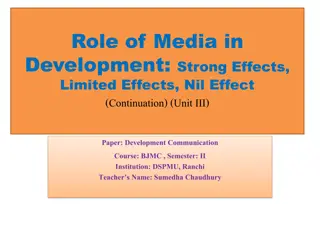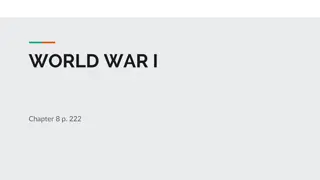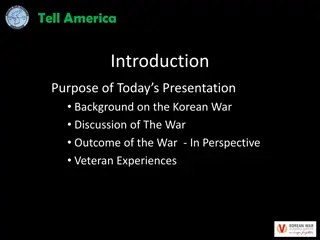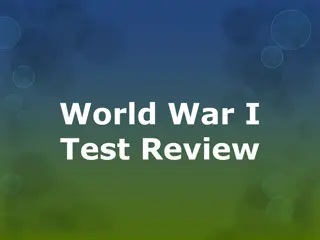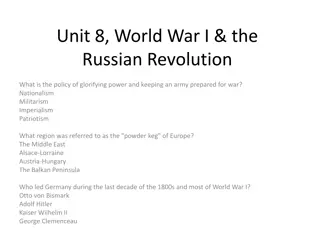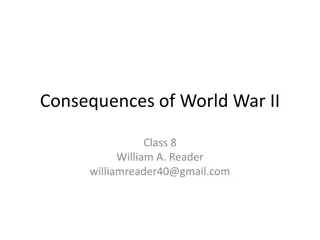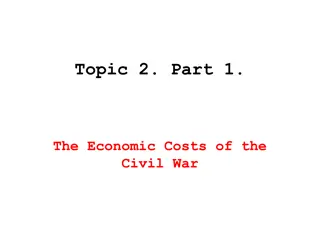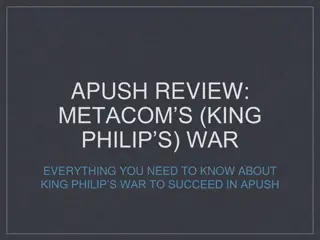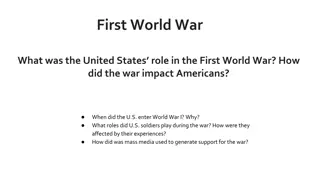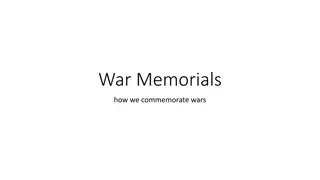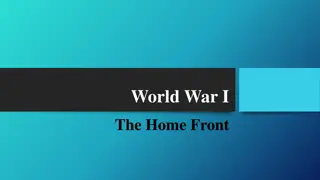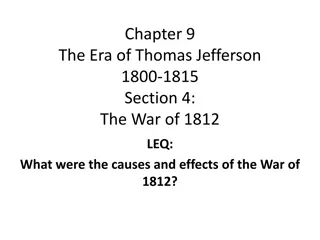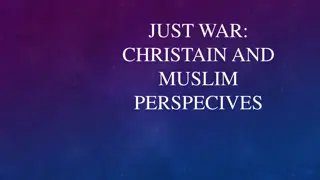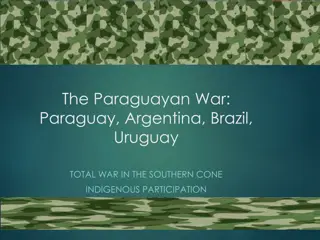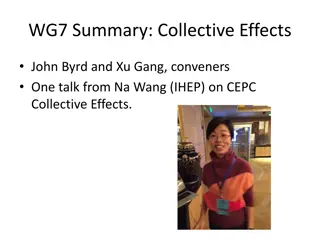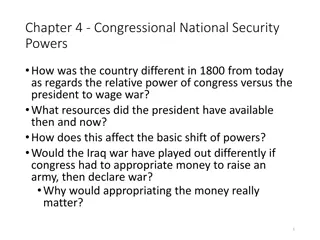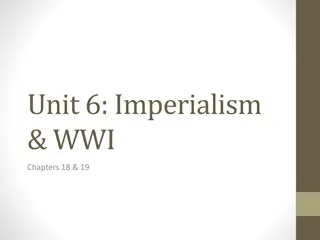❤[PDF]⚡ Civil War Talks: Further Reminiscences of George S. Bernard and His Fel
\"COPY LINK HERE ; https:\/\/getpdf.readbooks.link\/0813931754\n\nRead ebook [PDF] Civil War Talks: Further Reminiscences of George S. Bernard and His Fellow Veterans (A Nation Divided: Studies in the Civil War Era) | Civil War Talks: Further Reminiscences of George S. Bernard and His Fellow Vetera
1 views • 6 slides
Dominate the DSST A History of the Vietnam War Exam
Arm yourself with comprehensive study materials and expert guidance to conquer the DSST A History of the Vietnam War Exam. Unlock success with practice tests, study guides, and proven strategies. Start your journey to victory today!\nClick Here to Get History-of-the-Vietnam-War Dumps With 16 USD Dis
1 views • 6 slides
Post-Civil War Experiences in the South and West
Explore the intertwined experiences of Black and Indigenous communities in the aftermath of the Civil War, shedding light on the challenges and conflicts faced in the South and West regions. Delve into the complexities of Reconstruction, the impact of the Civil War on Indigenous peoples, and the pre
1 views • 24 slides
Exploring Historical Significance of Belfast During World War II
Assisting students in assessing the historical significance of Belfast during World War II through an enquiry-focused approach. The content covers key aspects such as the impact of World War II on Belfast, its strategic importance, political leadership, the Belfast Blitz of 1941, and key terms relat
0 views • 32 slides
The English Civil War and the Rise of the Stuart Dynasty
The English Civil War marked the end of the Tudor dynasty and the rise of the Stuart Dynasty in England. It was a time of conflict between the monarchy and Parliament, with issues revolving around divine right, religion, and political power. Leaders like James I and Charles I faced opposition from P
0 views • 13 slides
America's Entry into World War I: Causes and Impacts
World War I and the 1920s witnessed America's transition from neutrality to active involvement in the war. Factors such as nationalism, militarism, imperialism, and alliances led to the conflict. The impact of technological innovations resulted in stalemate on the Western Front, leading to significa
0 views • 11 slides
The Homefront: U.S. War Production Efforts During World War II
During World War II, the United States mobilized its industries for total war production, converting peacetime factories into facilities for producing planes, tanks, rifles, and more. The U.S. became the Allies' biggest armaments supplier, producing millions of war supplies and significantly boostin
2 views • 25 slides
Flowers of War: Margaret's Evacuation in the Highlands
In the short story "Flowers" by Robin Jenkins, set during World War Two in the Highlands of Scotland, Margaret experiences the challenges of war, loss of innocence, and isolation after being evacuated. The title serves as a metaphor, hinting at deeper themes within the narrative. Through the charact
5 views • 21 slides
Analysis of "The Man He Killed" by Thomas Hardy and Its Historical Context
Thomas Hardy's poem "The Man He Killed" explores the senseless nature of war through the perspective of a soldier who reflects on killing an enemy soldier whom under different circumstances, they could have shared a drink with. Set during the Second Boer War, the poem highlights the arbitrary nature
0 views • 12 slides
Analyzing Interaction Effects in Composite-Based SEM
Explore the concept of interaction effects in composite-based structural equation modeling (SEM) through topics like the logic of interaction, estimating effects, multigroup analysis, and visualizing effects. Learn about moderators, their role in relationships between variables, and techniques for a
1 views • 23 slides
Effects of First World War on Subcontinent
World War I, also known as the Great War, had significant negative impacts on the Indian subcontinent. Indians faced difficulties on the home front due to massive recruitment efforts, high taxes, and price hikes. The war led to a drain of wealth, food shortages, and a fall in the standard of living.
0 views • 7 slides
The Americanization of the Vietnam War: Escalation and Challenges
In February 1965, President Johnson escalated U.S. involvement in the Vietnam War through Operation Rolling Thunder, intensifying bombing campaigns and increasing troop commitments. This shift in strategy, driven by American assumptions and General Westmoreland's counsel, aimed to Americanize the wa
0 views • 12 slides
Examining State-Level and Dyadic Explanations for War in Global Politics
Understanding the reasons why certain states are more war-prone than others involves exploring factors such as economy, internal opposition, and political systems. Marxist explanations argue that capitalist economies are more prone to war due to issues like overproduction, wealth inequality, and imp
0 views • 17 slides
Carnatic Wars in the 18th Century: Conflict between Indian and British East India Companies
Carnatic Wars were a series of military conflicts in the mid-18th century between the Indian Company, British East India Company, and various independent rulers. Total of three wars were fought - First Carnatic War (1746-48), Second Carnatic War (1749-1754), and Third Carnatic War (1757-1763). The w
1 views • 12 slides
The First Carnatic War: A Historical Overview
Fought between English and French forces in the Carnatic region of Southern India from 1746 to 1748, the First Carnatic War was a significant conflict in colonial history. Led by key figures like Governor-General Dupleix and Major Stringer Lawrence, the war resulted in an inconclusive outcome with t
0 views • 6 slides
Origins of the Cold War: Yalta and Potsdam Conferences 1945
The Cold War's origins stem from the tensions and suspicions between the USSR and the West post-World War II, highlighted through conferences like Yalta and Potsdam. At the Yalta Conference, held in February 1945, crucial decisions were made regarding Germany, Poland, and the UN. The Potsdam Confere
0 views • 10 slides
Insights into World War Two and Adolf Hitler's Role
World War Two started on September 3, 1939, with Britain and France declaring war on Germany. Adolf Hitler's rise to power, initiation of the war, and involvement in the Holocaust are highlighted. The Star of David symbolized Jewish identity under Hitler's rule, and the Holocaust saw six million Eur
0 views • 6 slides
Understanding Interaction Effects in Regression Analysis using SAS 9.4
Regression models help analyze effects of independent variables (IVs) on dependent variables (DVs, like weight loss from exercise time). Interactions explore how one IV's effect can be modified by another IV (moderating variable, MV). In this seminar's purpose, techniques to estimate, test, and grap
0 views • 137 slides
Analysis of W.B. Yeats' Poetry During World War I
W.B. Yeats' poetry during World War I reflects a unique perspective on the conflict, as seen in works like "An Irish Airman Foresees His Death" and "On Being Asked for a War Poem." Delving into themes of sacrifice, duty, and the futility of war, Yeats offers a contrasting view to the graphic realism
0 views • 7 slides
Timeline of Key Events Leading to World War II
In the years leading up to World War II, a series of significant events unfolded in Europe. From Hitler's demands and annexations to the signing of pacts and the invasion of Poland, tensions escalated rapidly. The Munich Agreement, German offensive in Poland, declaration of war by France and Britain
0 views • 12 slides
The Impact of the Korean War on Global Relations
The Korean War, often dubbed the "Forgotten War," had significant implications on global politics and relationships. This conflict was characterized by a mix of conventional and guerilla warfare tactics. China's involvement in the war had a profound impact on its relations with the U.S. and the U.S.
0 views • 14 slides
The Spanish-American War: Origins and Impact
The Spanish-American War was fueled by a combination of factors including economic struggles, imperial ambitions, and sensationalist journalism. Theodore Roosevelt's stance on war, coupled with the desire for Cuba's independence from Spain, led to a call for war in the late 1890s. Yellow journalism
0 views • 18 slides
The Cold War Heats Up: Korea and China Conflict
The post-World War II era saw the U.S. engaging in the Korean War to combat communism, facing off against North Korea and China instead of Russia. Conflict in China between the Nationalists led by Chiang Kai-shek and the Communists under Mao Tse-tung intensified, with Chiang's authoritarian rule spa
0 views • 14 slides
Understanding Media Effects on Development: Strong, Limited, and Nil Impact (Continuation)
American psychologists have traditionally believed in strong media effects, attributing direct influence on audiences. However, the limited effects theory emerged in the 1940s, challenging this notion by suggesting media's negligible impact on behaviors such as voting. On the other hand, proponents
0 views • 6 slides
Causes and Outbreak of World War I
Various factors such as nationalism, imperialism, militarism, and the assassination of Archduke Francis Ferdinand led to the outbreak of World War I. The tensions in Europe escalated as countries formed alliances and mobilized for war. The conflict resulted in early battles like the Battle of Marne
0 views • 23 slides
Overview of the Korean War: Background, Discussion, and Outcome
This presentation delves into the background of the Korean War, highlighting the historical context from the Korean Peninsula's division after World War II to the outbreak of the conflict in 1950. It discusses the involvement of North and South Korea, as well as key players like the United States, t
0 views • 15 slides
World War I Test Review and Historical Overview
Learn about the key terms and concepts related to World War I, including militarism, nationalism, neutrality, propaganda, espionage, and more. Explore the long-term causes of the war, the immediate trigger, the Central Powers and Allied Powers involved, as well as important events like the Zimmerman
0 views • 13 slides
World War I and the Treaty of Versailles: Key Events and Consequences
The policy of glorifying power and militarism, the tensions in the Balkan Peninsula, Germany's leadership, causes of the United States' entry into World War I, impact of unrestricted submarine warfare, transition to total war, the end of the war with an armistice, the Treaty of Versailles assigning
0 views • 10 slides
The Impact of World War II on Japan and the Emergence of the Cold War
World War II had far-reaching consequences on Japan, leading to significant naval battles, intense fighting in Okinawa, and ultimately, the country's surrender following the atomic bombings of Hiroshima and Nagasaki. The post-war period saw the emergence of the Cold War as tensions rose between the
0 views • 63 slides
The Economic Costs of the Civil War and Its Impact on Growth
The Civil War led to significant economic costs for both the North and the South, including direct expenses such as government spending, destruction of physical and human capital, and indirect costs due to reduced consumption. The war resulted in massive casualties and had a profound impact on the e
0 views • 34 slides
King Philip's War: A Comprehensive Review for APUSH Success
Explore the key concepts, events, and impacts of King Philip's War, also known as Metacom's War, a significant conflict between colonists and Native Americans in New England. Understand the causes, course of the war, effects on both sides, and its lasting significance in shaping European/colonial re
0 views • 9 slides
The United States in World War I: Impact, Soldiers' Experiences, and Media Support
The United States played a significant role in World War I, entering the war in 1917 and sending soldiers to fight in Europe. The war impacted Americans socially and economically. U.S. soldiers served in various roles and were affected by their experiences. Mass media was used to generate support fo
0 views • 15 slides
Honoring Sacrifice: War Memorials Across the Globe
Explore a visual journey through various war memorials such as the Boer War Memorial in Belfast, the Menin Gate in Ypres, the Cenotaph in London, the Tomb of the Unknown Warrior in Westminster Abbey, the Korean War Veterans Memorial in Washington DC, the Vietnam Veterans Memorial Wall in Washington
0 views • 9 slides
America's Role on the Home Front during World War I
During World War I, America witnessed significant changes on the home front as the government took on new powers to regulate industry, agriculture, and public opinion. Women and minorities played crucial roles, voluntary rationing was embraced, and opposition by conscientious objectors was met with
0 views • 24 slides
The War of 1812: Causes, Events, and Effects
The War of 1812 was influenced by issues such as British impressment of American sailors, arming Native Americans, and trade restrictions. Despite opposition, President James Madison declared war in 1812. The conflict marked a period of American nationalism, with War Hawks pushing for war and Doves
0 views • 16 slides
Perspectives on Just War Theory from Christian and Muslim Standpoints
Just War Theory, rooted in Christian philosophy, aims to justify the use of force in specific circumstances to defend justice and protect human life. While pacifists reject all forms of war, adherents of the theory believe in certain criteria that must be met for a war to be considered just, such as
0 views • 16 slides
The Paraguayan War: Total Conflict in the Southern Cone
The Paraguayan War, also known as the War of the Triple Alliance, involved Paraguay, Argentina, Brazil, and Uruguay in a brutal conflict from 1864 to 1870. President Carlos Antonio López's policies and the ambitions of Francisco Solano López led to Paraguay's defiance of its neighbors, resulting i
0 views • 10 slides
Collective Effects in High-Energy Physics Facilities
Collective effects play a crucial role in Higgs factories and high-energy physics facilities. Impedance effects are proportional to beam-induced voltage, with peak bunch current impacting SB effects and average current affecting MB effects. Factors like beam loading compensation and detuning of the
0 views • 5 slides
Shift of Congressional Power in National Security Matters
The content discusses the historical and current power dynamics between Congress and the President in waging wars, including the resources available to the President then and now. It explores the implications of Congress having to appropriate money to raise an army and declare war, questioning how t
0 views • 68 slides
United States Foreign Policy Evolution from Imperialism to World War I
Explore the United States' foreign policy evolution from Imperialism to World War I, including the Open Door Policy, Dollar Diplomacy, and involvement in the Spanish-American War. Learn about the military actions in acquiring territories such as Puerto Rico, Guam, Philippines, and Hawaii. Delve into
0 views • 8 slides
![❤[PDF]⚡ Civil War Talks: Further Reminiscences of George S. Bernard and His Fel](/thumb/20551/pdf-civil-war-talks-further-reminiscences-of-george-s-bernard-and-his-fel.jpg)
